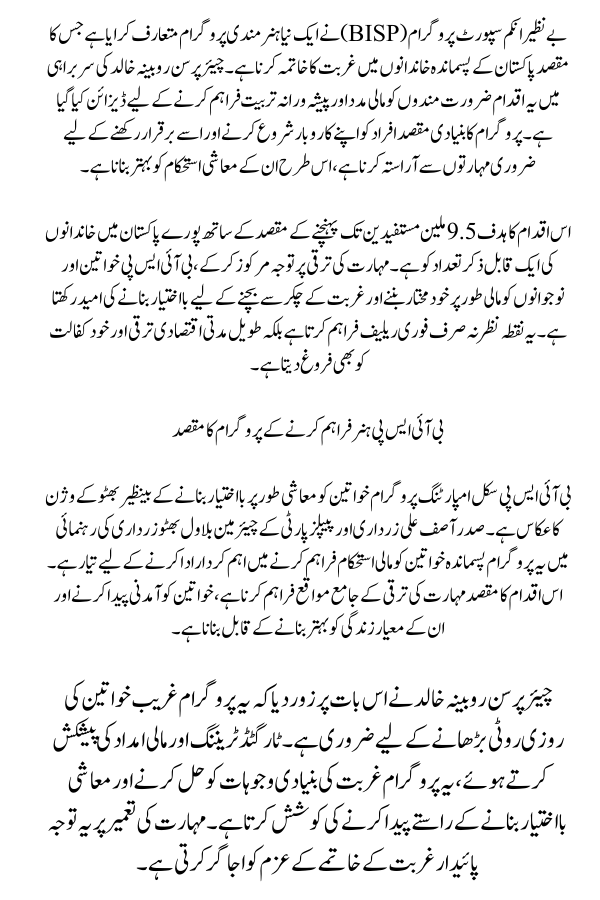The Benazir Income Support Programme (BISP) has introduced a new Skill Imparting Programme aimed at alleviating poverty among Pakistan’s underprivileged families. This initiative, spearheaded by Chairperson Rubina Khalid, is designed to provide financial support and vocational training to those in need. The program’s primary goal is to equip individuals with the skills necessary to start and sustain their own businesses, thereby improving their economic stability.
The initiative targets a significant number of families across Pakistan, with the aim of reaching 9.5 million beneficiaries. By focusing on skill development, the BISP hopes to empower women and young people to become financially independent and escape the cycle of poverty. This approach not only provides immediate relief but also fosters long-term economic growth and self-sufficiency.
Purpose of the BISP Skill Imparting Programme
The BISP Skill Imparting Programme is a reflection of Benazir Bhutto’s vision to economically empower women. Under the guidance of President Asif Ali Zardari and People’s Party Chairman Bilawal Bhutto Zardari, the program is set to play a crucial role in providing financial stability to disadvantaged women. This initiative aims to deliver comprehensive skill development opportunities, enabling women to generate income and improve their quality of life.
Chairperson Rubina Khalid has emphasized that this program is essential for enhancing the livelihoods of poor women. By offering targeted training and financial assistance, theprogramme seeks to address the root causes of poverty and create pathways for economic empowerment. This focus on skill-building highlights a commitment to sustainable poverty alleviation.

| Detail | Description |
| Programme Start Date | July 2024 |
| Target Beneficiaries | 9.5 million families |
| Key Focus | Skill development and financial aid |
| Leadership | Chairperson Rubina Khalid |
| Objective | Economic empowerment of women and youth |
BISP Chairperson Rubina Khalid’s Engagement
Chairperson Rubina Khalid has been actively involved in overseeing the implementation of the Skill Imparting Programme. She recently met with BISP staff to review the facilities and ensure the program’s smooth operation. Khalid emphasized the importance of addressing any issues faced by beneficiaries to streamline the process.
These meetings aimed to provide detailed guidance on the registration and payment procedures. By improving the efficiency of the program’s administration, BISP hopes to minimize delays and difficulties for beneficiaries. This proactive approach is intended to create a more accessible and user-friendly system for those seeking assistance.
Payment System for the 8171 BISP Skill Imparting Programme
The 8171 BISP Skill Imparting Programme introduces a transparent and efficient payment system for deserving women. The aim is to reduce the overcrowding at BISP offices and ensure that financial aid is distributed promptly. This new system is designed to make the payment process more manageable and dignified for recipients.
The program’s payment procedures are crafted to avoid unnecessary complications and delays. Women will receive their funds through a streamlined process, allowing them to focus on using their new skills to improve their economic situation. This emphasis on efficient payment reflects BISP’s commitment to providing meaningful and effective support.
Conclusion
The launch of the BISP Skill Imparting Programme represents a significant step towards reducing poverty in Pakistan. By focusing on skill development and financial aid, the program aims to empower women and young people, helping them achieve economic independence. This initiative not only addresses immediate financial needs but also supports long-term economic stability.
The success of the BISP Skill Imparting Programme will depend on its ability to reach and effectively assist its target beneficiaries. By providing practical training and support, the program has the potential to make a substantial impact on poverty alleviation and improve the lives of many Pakistani families.
